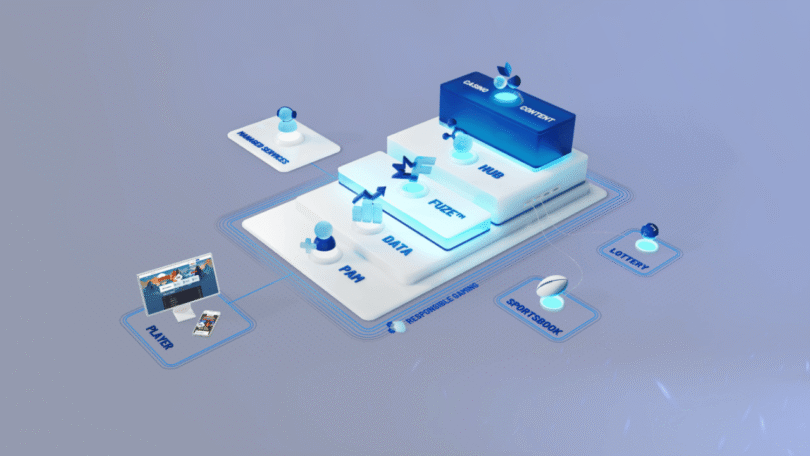“The right organizational culture is absolutely critical to truly leveraging AI’s potential”
One month ago, Luka Pataky was appointed EVP of AI and Innovation at Bragg. Today, he exclusively shares with us his thoughts about his new role, plans, and ambitions, as well as his overall view on leveraging AI in the iGaming industry.

What key experiences and insights from your career are you bringing to Bragg?
My journey in AI started long before the recent boom, giving me a unique perspective on its evolving importance. Through periods of both high hopes and challenging doubts, I learned a core lesson: AI must always deliver real, measurable business value, not just technology for technology’s sake.
My focus is consistently on identifying specific business goals and KPIs that AI can directly enhance. This means translating abstract ideas into concrete actions that genuinely impact the bottom line. For instance, I’ve led computer vision teams to build models for automated data collection, driving cost reduction and enriching data for new products and revenue streams like augmenting video streams or enabling microbetting. I’ve also found that AI rarely stands alone; it’s a key connector with existing systems. This requires skillfully aligning diverse teams and stakeholders, ensuring AI initiatives are deeply integrated and work seamlessly within broader business objectives and current technologies.
A truly rewarding aspect of my career has been building AI and Machine Learning teams from the ground up. This goes beyond just hiring; it’s about fostering diverse expertise and establishing mature processes for developing and deploying solutions. I prioritize attracting not only top-tier ML engineers but also ‘AI product managers’—individuals who bridge the gap between technical solutions and practical business needs. We implement robust processes for data management, model development, deployment, monitoring, and continuous improvement, ensuring our solutions are powerful, scalable, maintainable, and fully compliant with iGaming regulations. My experience includes setting up MLOps frameworks to guarantee operational excellence and minimize risks.
How about the specific iGaming experience?
With over a decade dedicated to innovation and AI within iGaming, I’ve gained a unique and profound understanding of how operators truly think and what drives their success. While our industry might not always be the first to embrace every new tech trend, this deep insight allows me to pinpoint precisely where AI can deliver significant, clear value.
I can easily grasp the intricacies of player behavior, the importance of responsible gaming, effective fraud detection, personalized marketing, and operational efficiency—all critical for an operator’s bottom line. This perspective enables me to build AI solutions that are not just theoretically advanced, but directly applicable to the specific needs of the iGaming business model.

My belief is that with a strategic, customer-centric approach and a clear demonstration of ROI, AI can genuinely transform iGaming. I excel at identifying those specific areas where even small AI improvements can lead to substantial increases in player engagement, significant operational cost savings, and enhanced profitability for Bragg and its partners.
You’re coming to Bragg from the sports data sector. How can key processes be transferred or adapted from one sector to another?
My recent experience in the sports data sector sits right at the intersection with iGaming, meaning the customer profiles and core dynamics are deeply connected. While specific datasets and regulatory details may vary, the fundamental principles of driving value, fostering a dynamic culture, and building robust technical solutions are universally applicable.
Innovation is a core part of what I do. The process of experimentation, continuous learning, and rapid iteration — honed in sports data — is the bedrock of any successful organization, and something I’m excited to bring to Bragg. I truly believe that bringing together experts from various departments and functions – product, engineering, data science, operations, and compliance– under one roof sparks incredible creativity. This cross-pollination of ideas often leads to breakthrough initiatives, and my expertise lies in building frameworks that encourage this interdisciplinary work, enabling faster experimentation and high-impact solutions.
The entire AI/ML development lifecycle is highly transferable. Regardless of the industry, the stages of problem definition, data preparation, model training, deployment, and continuous refinement remain consistent. I bring a deep understanding of managing this full process, including setting up reliable data systems, establishing tools for building and updating models, and continuously monitoring their performance. A key, consistent challenge is successfully integrating AI/ML development by aligning it with broader business objectives.
Ultimately, the performance indicators we aim to improve remain fundamentally similar. Whether it was enhancing engagement in sports data or optimizing gaming transactions, increasing GGR, or improving player lifetime value in iGaming, the core objective is always to drive business growth and operational efficiency through the intelligent application of data and technology.
In which areas of iGaming do you see particular opportunities for improvement using artificial intelligence?
The present offers incredible opportunities to leverage AI, fundamentally transforming how we operate and engage with players. Firstly, hyper-personalization is key. AI lets us dynamically tailor game recommendations, offers, and interfaces in real-time, based on individual player behavior. This creates a highly engaging and personalized environment, building deeper loyalty and satisfaction.
Secondly, predictive analytics across the board holds immense potential. In product, AI can forecast trends and identify successful features. For business, models provide more accurate projections. Crucially, in retention, AI can identify players at risk of churn, enabling proactive, targeted interventions that significantly improve player lifetime value. This shifts us from reactive measures to strategic foresight.
A profoundly important area is responsible gambling. AI offers capabilities far beyond human capacity here, analyzing vast datasets to detect subtle patterns and early indicators of problematic gambling habits. This allows for timely and precise interventions, protecting players and empowering operators to fulfill their social responsibility more effectively, building trust and ensuring a safer gaming environment.
Finally, there are vast opportunities within internal workflows to empower employees. AI can automate repetitive tasks, freeing up our talented teams to focus on high-impact, strategic initiatives requiring creativity and critical thinking. By augmenting human capabilities, AI ensures we dedicate energy to tasks that truly drive innovation and competitive advantage.
What does Bragg’s ambition to become an AI-first company look like, and what will your role be in achieving it?
At Bragg, our ambition to become an AI-first company marks a significant evolution. This means AI won’t just be an optional add-on; instead, it will fundamentally shape how we build products, operate, and engage with the market. It’s about embedding AI into the core logic of our services, our decision-making, and our internal workflows. We see AI as a key enabler of value creation, operational efficiency, and competitive differentiation in everything we do.
For our products, being AI-first means strategically identifying where AI can deliver the most impactful results – through personalization, automation, prediction, or augmentation. We’ll integrate AI where it provides a clear competitive advantage, elevating outcomes for Bragg, our users, and our clients, rather than simply making every product ‘about AI’.

Internally, this mindset involves redesigning workflows, augmenting employee capabilities, and making AI tools accessible across functions, truly empowering our teams. Externally, it shapes how we communicate and position ourselves regarding the responsible and strategic use of AI. Ultimately, being AI-first means AI doesn’t just support our existing goals; it reshapes how we define, pursue, and deliver them, driving our next wave of innovation and growth.
I’m excited to be instrumental in aligning the business around this vision, championing AI’s adoption as a strategic pillar. This involves not only guiding technical implementation but also fostering a culture where innovation, experimentation, and the strategic application of AI are embraced by everyone across the organization.
How do you view the combination of human creativity and artificial intelligence? Where can they complement each other at this stage of AI’s development?
I see human creativity and artificial intelligence as one of the most powerful and necessary partnerships in modern innovation. AI excels at processing vast data, spotting patterns, and accelerating iterations, but it’s human creativity that provides deeper understanding and context.
In iGaming, this partnership is especially exciting. AI can support idea generation, optimize player journeys, and personalize content at scale. Yet, it’s the human creative vision that brings meaning, emotion, and purpose to the experience. A game might be data-informed, but it needs to be emotionally engaging to truly succeed. What’s particularly valuable is how AI handles repetitive, time-consuming tasks like testing content variations, generating reports, or running predictive models. This frees up our human teams to focus on higher-value, strategic work. AI can crunch terabytes of data quickly, helping us make more informed product decisions.
There’s a crucial strategic layer: humans still make the big decisions about what to build, who it’s for, and why it matters. AI provides options and insights, but it can’t define purpose – that’s where human judgment is irreplaceable. By automating routine tasks, AI gives creative teams more room to actually create, focusing their energy on deeper, more original thinking.
Ultimately, this relationship is highly complementary. AI brings speed, scale, and efficiency; humans bring empathy, vision, originality, and crucial decisions. In a fast-evolving space like iGaming, we need both to truly innovate and accelerate our growth.
From your experience, how important is the right organizational culture for effectively and appropriately leveraging AI’s potential?
The right organizational culture is absolutely critical to truly leveraging AI’s potential. As I’ve seen, especially in iGaming, AI is rarely a standalone solution. You can’t just bolt it onto one department and expect transformative results; becoming AI-first requires a company-wide initiative and mindset. This means cultivating a culture where teams are open to experimentation, data is accessible and trusted, and people understand that AI is a tool to empower them. The most successful AI initiatives happen when cross-functional teams—product, marketing, tech, compliance, design—all view AI as part of their toolkit for success. This kind of alignment only happens with strong cultural support.
Leaders need to foster curiosity, psychological safety to ‘test and learn,’ and a shared vision of how AI can help us work smarter and better serve our players. Ultimately, AI’s effectiveness is as much about people and culture as it is about models and data. If the organization isn’t ready to collaborate, trust, and evolve with AI, even the most advanced systems won’t deliver meaningful impact.
Do you think that for gambling industry companies, investing more resources in AI-driven processes, tools, and products will become essential to stay competitive? Or is that already the case?
In the fast-moving, data-rich world of iGaming, investing in AI-driven processes, tools, and products is quickly becoming less of an advantage and more of a necessity. Companies not making these investments are already falling behind in areas like player personalization, real-time optimization, and operational efficiency. It’s about more than just having the right tools.
What’s truly essential now is the ability to meaningfully integrate AI across the entire organization. This means investing not only in the technology itself, but also in the culture, skills, and collaboration needed to truly unlock its value. The leaders in this space will be those who understand that AI isn’t a siloed initiative, but a strategic capability embedded in how they think and operate—like a superintelligence making them smarter and faster.
Recommended
